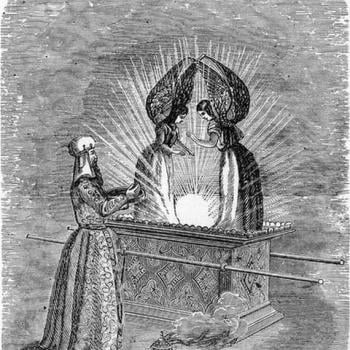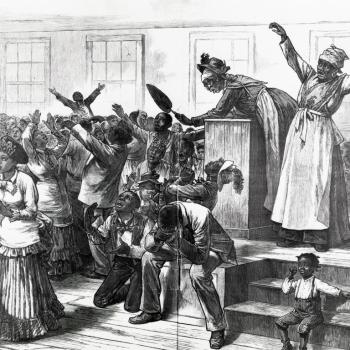The tale ends with the comment that "the boy Samuel continued to grow in goodness both with YHWH and with the people" (1 Sam. 2:26; the NRSV translators' addition of "stature" here is clearly provided under the influence of Luke 2:52 where Jesus is said "to increase in wisdom and in years, or stature, and in divine and human favor." There is no word "stature" in Hebrew, only the simple word "goodness," tov.)
What is important for our reading today is the context of this little vignette. While Samuel is "ministering" and is "growing in goodness," the terrible sons of Eli, Hophni, and Phineas are abusing their office as priests in ways too monstrous to imagine. The boys demand sacrificial meat before the fat is burned away, as was the custom (2 Sam. 2:13-17). When the one boiling the meat refused to give the fatted meat to them, they "would thrust their fork into the cauldron or pot or vat or kettle, and whatever the fork would pick up, they would take it away" (1 Sam. 2:14). "The boys' offense against YHWH was enormous, because they scorned YHWH's offering" (1 Sam. 2:17). All these deeds were done, "while Samuel was ministering to YHWH in Shiloh."
And as if that were not evil enough, their father Eli, aged and blind as he is, hears "all that his sons did to all the Israelites, and that they lay with the women who flocked to the entrance of the Tent of Meeting" (1 Sam. 2:22). Whether these women are sacred priestesses in the temple or merely worshippers come for aid from YHWH, Eli's sons commit sexual acts with them, perhaps reinforcing satirically and sexually their earlier acts of thrusting their forks in the boiling pots of meat. Meanwhile, Samuel is "growing in goodness with YHWH and people." Hophni and Phineas are mastering and using their people, while Samuel is ministering to them.
Which are you: preacher, minister, or master? You need not be abusing your flock sexually to be attempting to use or master them. You may be using them to affirm and raise you up as great and wonderful rather than ministering with them, helping them to affirm their own strengths and witness. You may be attempting to master them, to lead them in your own way, a way that you are convinced is the only way, rather than helping them find the way to God, the only way worth pursuing. Hophni or Samuel? Which is it?
In a deeper irony in my reading of the subsequent story of Samuel, he, too, falls into the traps of Hophni and Phineas, as he attempts to abuse and master Saul so thoroughly that the first king of Israel is rejected and deposed for what can only be called two technicalities of sacrifice as determined by the officious Samuel. The lure of mastering is ever great; the power of ministering is too often forgotten. This is a cautionary tale for all of us who are called to the work of God. May we be rigorous as we begin a new year of genuine ministry, calling our folk to their own ministry with grace and conviction.





